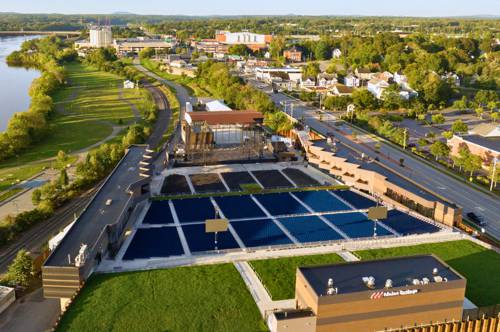
FAQ About Role of Performance Venues in Shaping Music History

What are some iconic music performance venues known for shaping music history?
Several iconic music performance venues have significantly shaped music history, each contributing uniquely to the evolution of music genres and careers. Venues like Carnegie Hall in New York City, known for its classical music influence, and The Fillmore in San Francisco, famous for its role in the rock and psychedelic music scenes, stand out. The Cavern Club in Liverpool is notable for its association with The Beatles, while CBGB in New York is recognized for its impact on punk rock. Each of these venues served as platforms for artists to grow and genres to evolve.

How have performance venues contributed to the emergence of new music genres?
Performance venues have often been at the forefront of new musical movements. By providing spaces where artists can experiment with and refine their sound, these venues create environments conducive to innovation. For instance, CBGB was pivotal in the development of punk rock, offering a stage to emerging bands like The Ramones and Blondie. Similarly, the Harlem Apollo Theater helped in shaping jazz, blues, and soul music by giving a stage to numerous African American artists during the 20th century.

Why are performance venues considered crucial to an artist’s career development?
Performance venues are critical to an artist's career because they help in honing live performance skills, gaining exposure, and connecting with audiences and industry professionals. Success at well-regarded venues can enhance an artist's reputation and provide credibility within the music industry. Additionally, venues often act as networking hubs where artists can meet other musicians, producers, and agents who may influence their career trajectory.

In what way do performance venues serve as cultural landmarks?
Performance venues serve as cultural landmarks by being physical spaces where significant cultural exchanges occur. They often reflect the cultural and historical fabric of their location. For example, London’s Royal Albert Hall is not only a venue for music but also embodies Britain's cultural heritage. Performance venues also host events that can become culturally iconic, immortalizing moments in music history that resonate with audiences worldwide.

What role did the Fillmore in San Francisco play in music history?
The Fillmore in San Francisco played a pivotal role in the music scene of the 1960s, becoming a hub for psychedelic music and the counterculture movement. Managed by promoter Bill Graham, it hosted legendary performances by artists like Jimi Hendrix, The Grateful Dead, and Janis Joplin. The Fillmore helped to popularize new sounds and creative expressions, significantly shaping the musical landscape of the time.

How do small venues differ from large ones in shaping music history?
Small and large venues both contribute to shaping music history, but in different ways. Small venues often serve as breeding grounds for new talent, offering intimate settings where artists can experiment and directly connect with audiences. They are essential for grassroots movements and DIY culture. On the other hand, large venues cater to established artists, providing platforms where major historical musical moments and large audience engagement occur. Both venue types are essential, reflecting different stages of an artist's development and audience reach.

Can you explain how venues like CBGB influenced punk rock?
The venue CBGB in New York City was instrumental in the emergence and popularization of punk rock in the 1970s. Originally intended to host Country, BlueGrass, and Blues music, its owner, Hilly Kristal, eventually opened its doors to bands like The Ramones, Television, and the Talking Heads, providing a platform for their gritty, energetic music styles. Through its reputation as a grungy, experimental venue, CBGB nurtured a thriving punk scene that helped redefine popular music culture.

What are the characteristics of venues that have historically shaped music culture?
Venues that have shaped music culture typically share certain characteristics: a strong connection to their local community, openness to new and emerging talent, and a willingness to host diverse music genres. They often have passionate promoters who champion new sounds and foster artistic communities. For instance, venues such as The Troubadour in Los Angeles are known for their intimate ambiance and support for upcoming artists and bands, thus leaving a lasting impact on music history.

What impact did The Cavern Club have on The Beatles' career?
The Cavern Club in Liverpool is famously known as the birthplace of The Beatles. It provided the band with a consistent platform to perform and refine their music between 1961 and 1963, allowing them to develop a loyal local fanbase. The club's environment helped them hone their performance skills, eventually leading to a recording contract with EMI and international fame. The Cavern Club thus played a crucial role in launching The Beatles’ legendary career.

How do performance venues influence local music scenes?
Performance venues significantly influence local music scenes by acting as cultural hubs where musicians gather, collaborate, and perform. They often drive the local music economy by hosting events and attracting audiences, which can lead to increased visibility for local artists. Venues help maintain a vibrant music ecosystem by supporting local talent and providing platforms for artistic expression, often reflecting and nurturing the area's unique musical identity.

What is the historical significance of the Royal Albert Hall in music history?
The Royal Albert Hall in London is historically significant for its diverse range of performances and its role in England's cultural history. Since its opening in 1871, it has hosted classical concerts, rock and pop gigs, operas, and the annual BBC Proms. The Hall’s wide array of offerings and its architectural grandeur have made it a symbolic venue for both British and global artists, contributing immensely to music and cultural history.

How do iconic music venues become part of popular culture?
Iconic music venues become part of popular culture by hosting notable performances or being featured in significant cultural moments that resonate with broader audiences. Over time, they accumulate a history rich with stories and events that contribute to their mythos. Venues like Madison Square Garden and Red Rocks Amphitheatre have seen legendary performances that permeate media and public consciousness, solidifying their status as cultural landmarks.

Why are music venues important for genre experimentation?
Music venues are crucial for genre experimentation because they provide musicians with live settings to test and refine new musical ideas. Venues are often places where diverse groups of artists and audiences converge, encouraging the blending and creation of new sounds. This environment fosters innovation across genres, allowing artists to push boundaries and influence shifts in music culture. For example, the Whisky a Go Go club in Los Angeles has been influential in the evolution of rock and roll and the birth of heavy metal.

What is the link between music venues and music festivals?
Music venues and music festivals are intrinsically linked in that they both serve as platforms for musical performance but differ in scale and scope. Venues offer continuous, localized engagement with music, providing a stable space for artists to perform regularly. In contrast, music festivals often arise from the culture nurtured in smaller venues and provide larger, often seasonal, platforms that spotlight a wider array of artists, often drawing influence from the sonic diversity of venue shows.

How do economic factors affect performance venues?
Economic factors play a significant role in the viability and operation of performance venues. Venues are heavily influenced by local economic conditions, real estate costs, and patronage levels. Economic downturns may lead to reduced attendance, posing operational challenges. Additionally, gentrification and increasing rental costs can threaten the survival of small, independent venues, potentially impacting local music scenes adversely. Conversely, economic booms can lead to more investment in venues, enhancing their facilities and offerings.

Why are historical music venues often preserved as heritage sites?
Historical music venues are often preserved as heritage sites because they hold cultural, historical, and architectural significance. They are seen as repositories of musical and artistic memories and experiences, reflecting pivotal moments in music history. By preserving these venues, communities acknowledge the roles these sites have played in shaping cultural identities and music history. Additionally, preservation efforts help future generations access and understand past musical traditions and innovations.

How did the Apollo Theater contribute to the civil rights movement?
The Apollo Theater in Harlem contributed significantly to the civil rights movement by being a prominent stage for African American artists during a time when segregation restricted access to other venues. It showcased non-white performers to diverse audiences, fostering cultural exchange and acceptance. Artists who performed there often used their platforms to voice support for civil rights, making the theater a symbol of resilience and cultural pride during times of racial inequality.

What role do venues play in streaming and online music promotion today?
In today’s digital era, venues play an increasingly important role in streaming and online music promotion by hosting live events that can be broadcast globally. Livestreaming from iconic venues allows artists to reach wider audiences beyond physical attendance, expanding their fan base and engagement. It also provides venues with greater visibility and new revenue streams, reinforcing their relevance and influence in the evolving music industry landscape.

What is the relationship between venue location and genre dominance?
There is often a strong relationship between venue location and the dominance of certain music genres. Venues located in regions with a particular cultural or historical background can influence the local music scene and spur the growth of specific genres. For example, Nashville, known as “Music City,” has a rich history in country music, with venues like the Grand Ole Opry playing pivotal roles in its prevalence. Similarly, jazz thrives in venues throughout New Orleans, leveraging the city’s deep musical heritage.

How do performance venues adapt to changing musical tastes over time?
Performance venues adapt to changing musical tastes by diversifying their programming and embracing new technologies and trends. Many venues update their facilities to keep pace with both acoustic advancements and audience expectations. They may also adjust their marketing strategies to appeal to contemporary audiences and remain culturally relevant. By doing so, venues continue to attract diverse acts and maintain their historical importance in the ever-evolving music industry.
